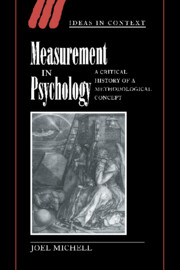Book contents
- Frontmatter
- Contents
- Preface
- Acknowledgments
- 1 Numerical data and the meaning of measurement
- 2 Quantitative psychology's intellectual inheritance
- 3 Quantity, number and measurement in science
- 4 Early psychology and the quantity objection
- 5 Making the representational theory of measurement
- 6 The status of psychophysical measurement
- 7 A definition made to measure
- 8 Quantitative psychology and the revolution in measurement theory
- Glossary
- List of references
- Index
- IDEAS IN CONTEXT
3 - Quantity, number and measurement in science
Published online by Cambridge University Press: 22 September 2009
- Frontmatter
- Contents
- Preface
- Acknowledgments
- 1 Numerical data and the meaning of measurement
- 2 Quantitative psychology's intellectual inheritance
- 3 Quantity, number and measurement in science
- 4 Early psychology and the quantity objection
- 5 Making the representational theory of measurement
- 6 The status of psychophysical measurement
- 7 A definition made to measure
- 8 Quantitative psychology and the revolution in measurement theory
- Glossary
- List of references
- Index
- IDEAS IN CONTEXT
Summary
Every measurable thing … is imagined in the manner of continuous quantity.
(Nicole Oresme)Quantity communicates with number.
(Samuel Alexander)What must the world be like, in its most general features, given that at least some attributes can be measured and given that it is possible that some quantitative theories are true? Answering this question requires unfolding the metaphysics or logic of quantification. That logic unfolded, one has a framework within which attempts at quantification can be critically assessed. In particular, this enterprise provides a basis for a critical history of quantification in psychology and a critical analysis of Stevens' definition of measurement.
If measurement of an attribute such as, say, length (or distance), is sometimes successful and some quantitative theories such as, say, the theory that the area of a rectangle is its length times its breadth, are true, then attributes such as length and area must be quantities. Thus, a part of understanding the logic of quantification is defining the concept of quantity. This much tells us the kind of attributes that are measurable. Another part is showing how magnitudes of a quantity relate to numbers. This tells us what measurement is. A third part is showing how the hypothesis that an attribute is quantitative can be tested by observational methods and how procedures for discovering quantitative relations can be established. This tells us how to quantify.
In investigating these issues and proposing a logic of quantification I will be largely synthesising answers given by others.
Information
- Type
- Chapter
- Information
- Measurement in PsychologyA Critical History of a Methodological Concept, pp. 46 - 77Publisher: Cambridge University PressPrint publication year: 1999
